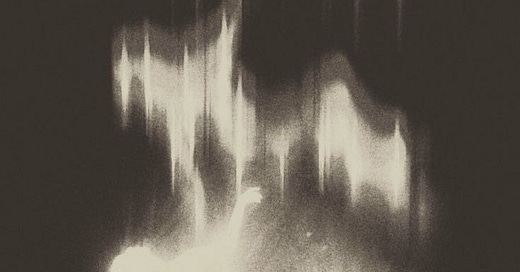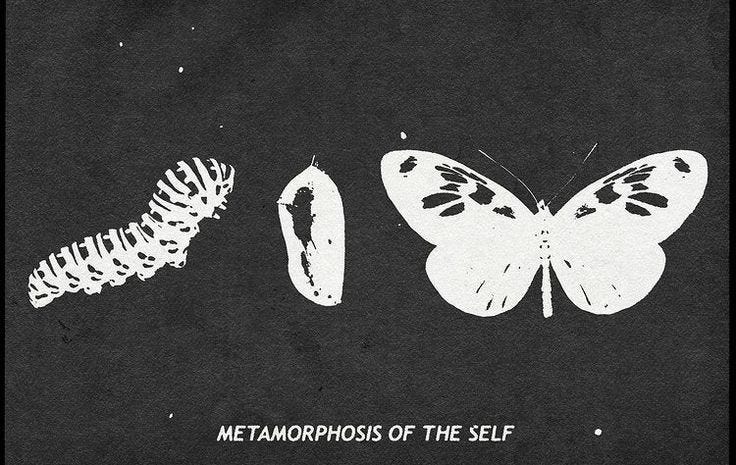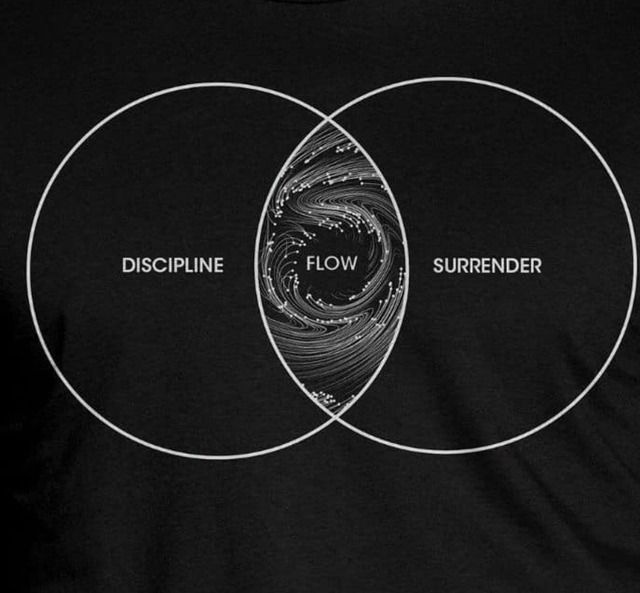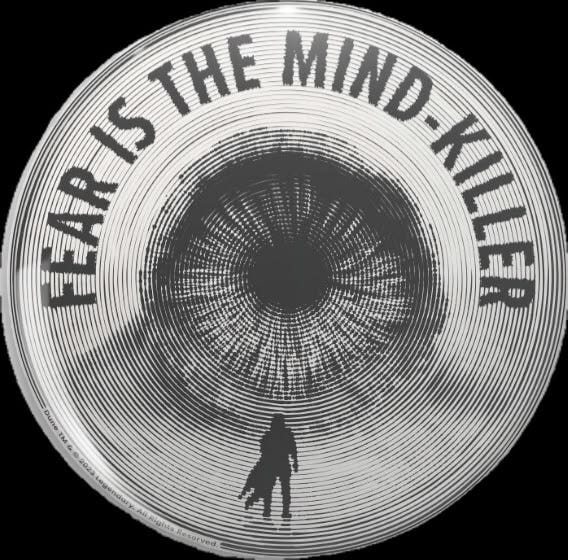I’ve spent much of my life emotionally dysregulated. At five years old, I would get sent to the principals’ office for crying inconsolably about my macaroni art not being perfect, then start a screaming match with another student for “breaking the rules” (it was always some minor infraction, like swearing or stealing crayons), then spend my evening trying to telepathically communicate with koi fish in our back garden to find out if they felt trapped in their pond. The day would inevitably end with me hyperventilating for an hour at bedtime over the knowledge that my parents would one day die, or the fear that I would experience ego death in the afterlife, or most often, about the deeply painful sense of alienation I felt from other children.
From birth, I have been very in love with the world, and also hounded by a deep and abiding sense that something is wrong here.
I was (and remain) a sensitive, serious lovergirl in a callous, flippant world. While my ability to self-soothe and stay resilient has grown exponentially over the years, I am still highly reactive to the moods of people around me. I am influenced by the ~tides of the vibes~.
You can see how the recent shift the US towards legislative brutality and willful stupidity, cruel and unjust treatment of immigrants and minorities, ecological devastation, and regressive and rigid sexual and gender norms is hard on my internal ecosystem. Even when I’m not watching the news, I can feel that shift around me and the stress its putting on everyone. The way it’s making us more reactive, more insular, more paranoid and quick to anger. The vibes are big time rancid.
But this is the world we have inherited, and no matter what billionaires with rocketships say, there is no where else to go. Stewarding the earth and its inhabitants with courage and compassion is not only the right thing to do, it’s the only thing we can do. And that’s a challenge I want to step into present, regulated, and rooted to the core of my own being.
Turning Inwards As A Source of Power
I was raised in a religious household, steeped in the cultural mores of naughties WWJD mass-market Hillsong United pop evangelicalism, as well as a home life that encouraged rigorous religious engagement and and openness to the supernatural, even among children. I am my father’s daughter in so many ways, and our long and complex (sometimes fraught, but always rewarding) personal relationships with religion mirror each other. My father taught me that the soul is worth cultivating, but that certainty is the death of faith, and that as life shakes you, your faith will have to adapt to survive.
As I got older and began to challenge the hardline institutional Christianity of my youth, spirituality remained a deep well that nourished me. Especially as I applied myself to the lifelong work of feeling my intense emotions without running away from them into work or escapist pleasure, and letting them move through my body without resulting in a total meltdown.
Sometimes traditional frameworks have helped me in this quest, and other times they have not. I have a masters degree in theology from Princeton Theological Seminary, and for some years I was confident I would spend my days as an Episcopal priest, after all. But spiritual deconstruction and reconstruction is the rhythm of my life that makes me who I am. The more I surrender to that cycle, the clearer the path ahead of me becomes, and the closer I draw to the heart of God.
Religious brief is not a single north start that guides me, but a constellation of divine fractals inviting me to steer the boat of my life by navigating by all of them. It’s not that I don’t believe in objective truth. It’s that truth is bigger and more beautiful and more terrible and complex than a human mind can comprehend, and so the best way I can honor truth is by bowing to her in whatever visage she appears to me in, welcoming her as a lover or a friend or a challenger.
At the end of the day, it’s really not about what I believe. Dogma is fluid and the product of context and feeling, and religious affiliation is flimsier than we would like it to be. Spirituality isn’t just something I believe anymore, it’s something I do, and it exists to keep me safe, steady, and strong so that I can do the work I want to do in the world and relate to the people I love from a foundation of power, compassion, and clarity.
So, here’s how I learned to do that. I’m not here to proselytize or lecture you. I just want to share some tools that have saved my life, over and over again. Everyone has a spiritual sense within them. We all want to find ways to feel connected to ourselves, to others, and something bigger than ourselves, even if it’s only an ideal.
Moving from Dogma to Praxis
A spiritual belief is something you hold in your heart and your head. A spiritual practice is something you do in your body, like prayer, chanting, yoga, walking labyrinths, reading scripture, volunteering in a soup kitchen, having sex, picking up litter, swimming in the ocean, even breathing. Almost anything can be a spiritual practice if you turn your attention towards the task with reverence and loving care, and if you surrender yourself to the ways in which it will shape your soul, like waves against rocks.
The Safe-Steady-Strong Menu
You might be familiar with the concept of a dopamine menu. “Coined by podcast host and ADHD coach Eric Tivers and How To ADHD founder Jessica McCabe, a dopamine menu is a curated list of activities that will provide a dopamine boost whenever you need it”.
I think of my routine spiritual practices as my safe-steady-strong menu. Practices that bring me soothing comfort and a sense of belonging, keep me regulated and brings clarity of thought, and help me become more resilient as I grow towards my (and the world’s) highest good.
After approaching exploring spiritually as a practitioner, academic, and artist for thirty years, my spiritual practices that yield the best results have remained and deepened, while others have fallen away. That doesn’t mean those other practices are all wrong, or that they won’t find me again in the future. It simply means I don’t have time for all that, especially when the world is on fire and I need to stay well for myself and for the people that I love.
If my twenties were dedicated to tasting with the world’s cornucopia of spiritual practices, my thirties are all about fixing my own plate with the most nourishing offerings I’ve picked for myself, and practicing the art of discernment in the process. After all, spiritual practices don’t exist to make us feel good about ourselves or entertain us, they exist to nourish our spirits.
What If I Don’t Have The Discipline for Consistent Practice?
Baby, me neither! Let’s get one thing straight: building a spiritual regimen takes years and is subject to constant change; you are not going to be able to keep to it every day, or every week. There will be days when things fall through the cracks, and whole seasons where you fall off the wagon. That’s normal and expected, and it’s actually a part of building lifelong connection with the sacred within and without. Its the coming back to the path over and over, that closing of the broken circle, that is holy.
This isn’t about being right, or being good, or being the best. It’s not about getting from point A to point B. It’s about sustaining yourself on the daily adventure and challenge of a life well-lived.
My Rituals
Here’s a look at the practices that sustain me, day by day, and how frequently I do try to do them.
As Many Times A Day as Needed
Mindful presence
As someone who can easily get swept up into worries about the future or ruminations on the past, and slip through the cracks into imaginary worlds, remaining in my body in the present moment is crucial. I want to be right here, right now, open to all the pleasure and the pain of the present. So when I feel my attention drifting, whether I’m overthinking or numbing out, I try to focus on my breathing and gently guide my mind’s eye back to the right now. Sometimes its counting down from ten, sometimes its scanning my body for sensation, sometimes its naming the emotion I’m experiencing without judging it or trying to resolve it into some sort of solution.
Prayer, extemporaneous and rote
I am incredibly lucky that I was raised in a household that taught me that prayer had no rules, no etiquette, no expectations. It’s just opening up your heart to divine connection, whether you’re resting in love or picking a bone. In my estimation, God is a big girl just like me, and She can take whatever I throw at Her, whether that’s my anger or hope or grief or panic. Even when everything feels pointless and faith is far away, I reach for the stories at my heart’s foundation of a God who dwells with us in our suffering, a God who works for the ultimate wholeness of all creation, and then I reach out to that God. I’m not sure I believe everything happens for a reason, but it feels good not to be alone in whatever happens. I just tell God what’s going on and ask for whatever it is I need in that moment.
As far are rote prayer goes, I’m talking about words we’ve inherited from history preserved by the faith of many generations. The gorgeous thing about reaching for a rote prayer is that you don’t need to conjure any words of your own, especially if you’re scared or laid low with sadness or don’t know what to say. My favorites are the Our Father and the Hail Mary, and I reach for the prayer to Saint Michael when I need protection. Sometimes — and don’t tell your priest this — I will even recite the litany against fear from Frank Herbert’s Dune. I don’t care that it’s from a science fiction novel, it works.
Once A Day
Journaling with an emphasis on gratitude
This is is load-bearing for my mental health. As a writer and a verbal processor and a true Thought Daughter, my diary is my best friend. Some entries are just a sentence, some entries are pages and pages. Sometimes I vent or workshop difficult conversations, sometimes I write poems or manifestation scripts. I share my hopes and dreams, I romanticize my life, I leave record of my existence. And in all of it, I express gratitude. Gratitude is like a cold glass of water: it sustains you and keeps your mind awake and sharp.
Keep reading with a 7-day free trial
Subscribe to The Epistle to keep reading this post and get 7 days of free access to the full post archives.








